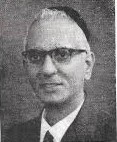Prof. Yehuda Ratzaby was born in the small village Sava'n in central Yemen, a two-hour walk from Sanaa. His father, Rabbi Yeh'ya, was one of the leaders of the community there. While still a child studying in the local “Cheder”, his family suffered bereavement and deprivation. There, he learned the traditional prayers according to the local custom, and how to read the Torah with the Aramaic translation.
Ratzaby immigrated to Israel with his family in 1924, when he was eight, and they settled in the city of Tel Aviv. He attended the Tachkemoni School (A Talmud Torah for Yemenites children) and the Balfour Gymnasium. In 1936, at the age of 20, he began studying at the Hebrew University of Jerusalem, and studied there until 1939. He studied Arabic language and literature, Hebrew literature, and Bible, and received his Master's degree from the University.
After graduating, he began working in the security service. When World War II broke out, he was called to volunteer for 'Shay', the Haganah's intelligence service. After the establishment of the State until 1962, he served in the Intelligence Corps in the Ministry of Defense. At the same time, he published articles in his areas of interest: Israeli literature and Yemeni culture.
In 1963, he completed his studies at the Hebrew University and was awarded a doctorate. From 1964, he taught Arabic-Jewish literature and medieval Hebrew literature at Bar-Ilan University, Tel Aviv University, and the Hebrew University of Jerusalem.
Prof. Yehuda Ratzaby lived in the city of Tel Aviv and had three daughters and a son named Amitay who was killed during his military service in the Intelligence Corps at the age of 22. (1976)
Prof. Ratzhaby was involved in researching the Cairo Geniza and manuscripts from Yemen. He published many studies about Rabbi Saadia Gaon and the poetry of Rabbi Yehuda Halevi, as well as poems by Yemenite poets such as Rabbi Shalom Shabazi. He also published many studies on the culture of the Yemenite Jews. He has written 25 books, and more than a dozen articles which have been published in in scientific journals, and in literary issues of newspapers. Three of his books have won him prestigious awards: Twice in 'the Bialik Prize for the Wisdom of Israel', in 1965 and 1979, and in 1990 he received the 'Rav Kook Prize for Torah literature'. In 1996 he received the Israel Prize, and in 1992 he was awarded as “Beloved of the City of Tel Aviv”.
Source: .אהרן גימאני, 'פרופ' יהודה רצהבי: במלאת עשור לפטירתו' בתוך תהודה, כתב עת למורשת יהודי תימן, גליון 34 תשע'ח. 163- 178
See also:
His list of publications at the National Library of Israel website.
An article he wrote about secular melodies in holy songs (In Hebrew): הניגון הזר בשיר ובפיוט
Yemenite Qasīd Songs (Hebrew)




